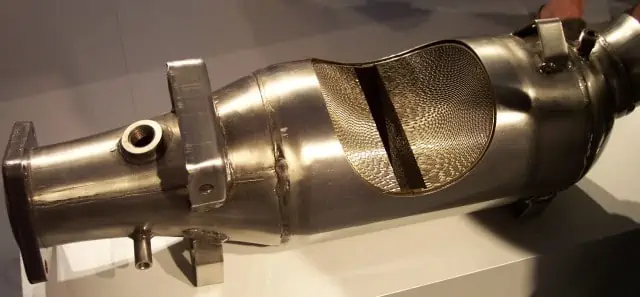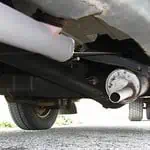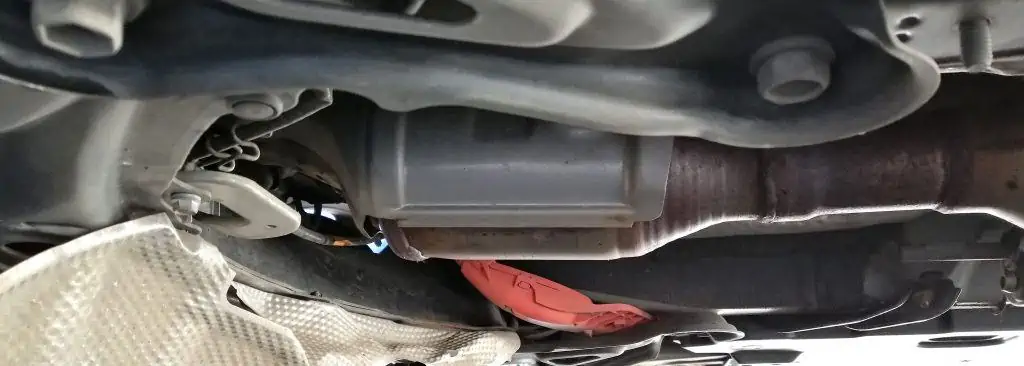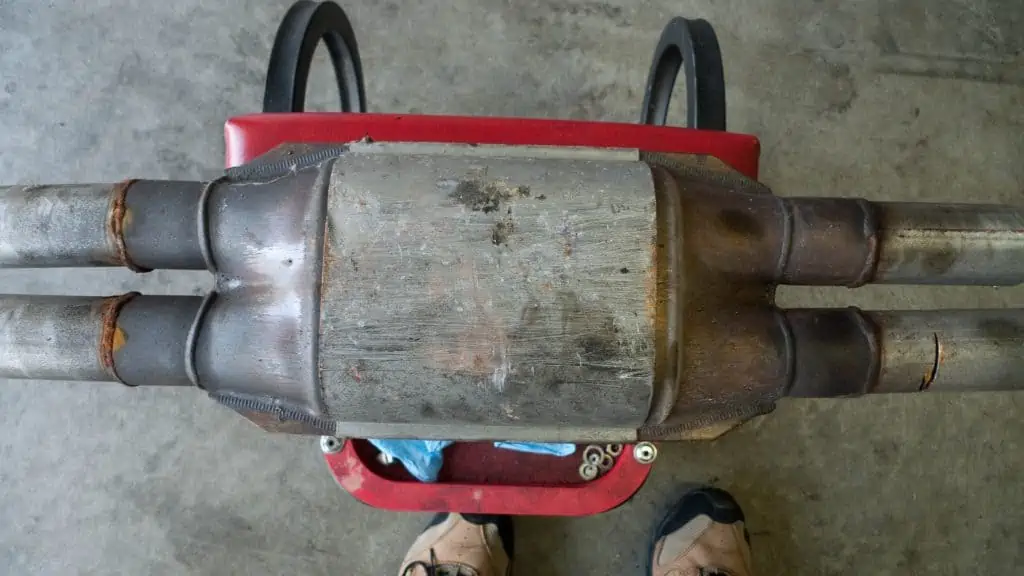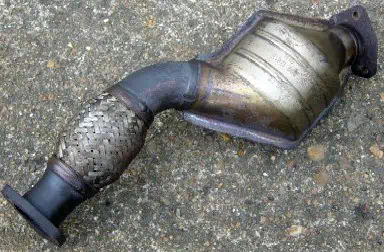Your car’s catalytic converter is in charge of safely removing emissions gasses from the atmosphere. The car might fail an emissions inspection if it isn’t operating as it should. Most of the time, replacing the catalytic converter is the only choice. But how much does it cost to replace the catalytic converter?
A catalytic converter is a device that almost everyone who knows anything about vehicles has heard of. But the majority of people are unaware of what they do or how much it would cost to replace them. They are both an essential component of your car’s exhaust system and a significant financial outlay.
What are their prices, then, and why are they so expensive? If the sad circumstance arises where you must replace your catalytic converter, we will provide you with all the information you need.
Even junk automobiles have some worth; however, the exact value of your car depends on a variety of circumstances.
What Is a Catalytic Converter?
The catalytic converter is a component of the exhaust system of your automobile. Although it is made of diverse materials, it has a muffler-like appearance.
A special honeycomb-like structure that houses catalyst particles that mix with the exhaust gasses is found inside the catalytic converter. Platinum, palladium, and rhodium are some of these possible particles.
The emissions system in your automobile treats the exhaust gasses your engine generates before releasing them into the environment.
A crucial component of this procedure is the catalytic converter. There may be one or more catalytic converters in your automobile. They include priceless metals that function as catalysts, chemically combining with exhaust gasses and extreme heat to eliminate harmful pollutants from the exhaust.
Cutaway of a metal-core converter by Stahlkocher / CC BY-SA 2.0
The high expense of replacing the catalytic converter is due to these valuable metals, which are also occasionally targeted for theft.
The performance of your catalytic converter is also monitored by your car, and if required, the amount of gasoline poured into the engine can be changed.
The amount of gas in the exhaust system may be measured using oxygen sensors in your car. After the catalytic converter, these sensors are found inside the exhaust pipe.
In this manner, your automobile can determine whether the converter is functioning properly. You could have oxygen sensors both before and after the converter in some circumstances.
A few cars also feature several catalytic converters. This is particularly valid for high-performance vehicles that force a significant amount of exhaust gas via their exhaust systems.
How Does a Catalytic Converter Work?
Catalytic converter designs are often rather straightforward. No complicated computer technology or moving parts are utilized.
Particles of a catalyst made of platinum, palladium, and rhodium are coated on a ceramic honeycomb component found within catalytic converters.
When the engine of the automobile is running, exhaust gasses go through the catalytic converter, where three dangerous substances such as hydrocarbons, carbon monoxide, and nitrogen oxides are heated up and undergo a chemical reaction with the catalyst that produces less dangerous pollutants.
What Leads to a Catalytic Converter Failure?
Catalytic converters typically last the whole life of the car, although there are certain exceptions. Your catalytic converter can malfunction if coolant, oil, or unburned gasoline enters it; if it sustains external damage; or even if it just wears out. Some of the reasons for a failing catalytic converter include the following:
- Large mileage
- Unhealthy fuel injectors.
- Faulty spark plugs.
- Incorrect exhaust valves.
- Unreliable ignition system.
- Poor head gas.
Intake manifold leakage.
- Lead gas use.
- Defective oxygen sensor.
- Road debris or curb impacts.
Common Signs That the Catalytic Converter Replacement Cost Is Inevitable
Certain telltale warning indicators indicate when catalytic converters are starting to malfunction. Here are five indications that it might be time to get your catalytic converter inspected:
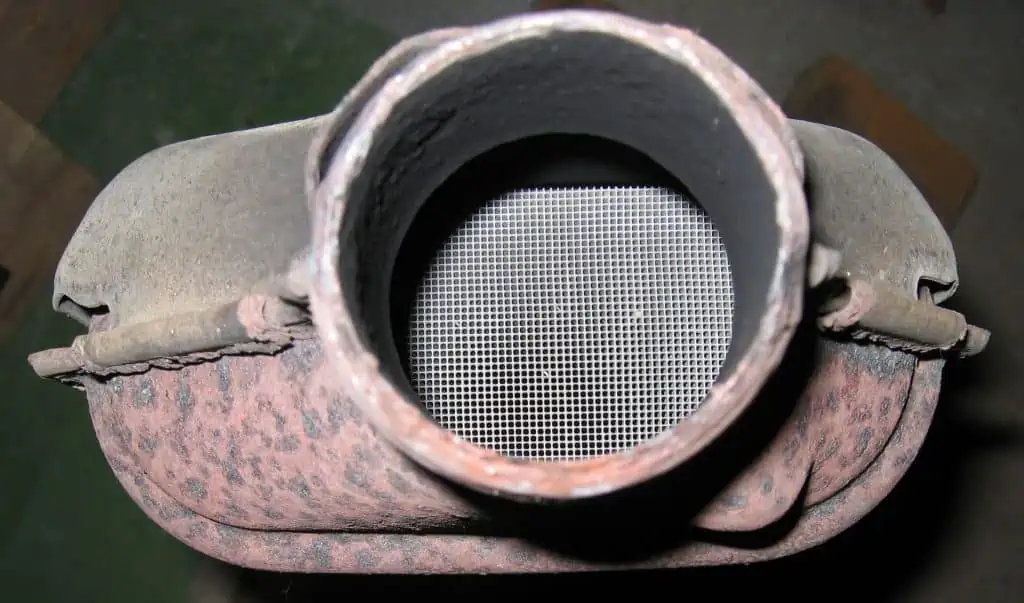
A Rattling Sound
As soon as a catalytic converter sustains damage, this occurs. The age of the vehicle or the gasoline combinations used in the car may be the cause. The rattling, which is caused by a failing converter mesh, is particularly audible when the engine is started for the first time.
A Check Engine Light Appears with Code P0420.
There are several causes for the check engine light to illuminate, but it always does so when the oxygen and air-fuel ratio sensors detect a problem.
Decreased Engine Performance
This is frequently one of the first symptoms of a failing catalytic converter, so keeping a close eye on how your car runs is a fantastic way to identify the issue early. Reduced power, sluggish acceleration, and poor fuel efficiency might be some of the earliest things you notice.
The Exhaust has a Sulfurous Odor.
Due to the presence of sulfur in gasoline, when it is burned, hydrogen sulfide is produced. The catalytic converter subsequently transforms this gas into sulfur dioxide, which has no odor.
Unburned gasoline that has a stench remarkably similar to rotten eggs is left in the exhaust when a catalytic converter malfunctions, though.
Failed Emissions Test
To ensure that your automobile is correctly burning gasoline and not releasing harmful gasses into the atmosphere, most areas of the United States require your car to undergo a smog inspection every few years.
A defective catalytic converter is among the most common causes of a failed smog test.
How Much Does a Catalytic Converter Replacement Cost?
The typical cost of the parts and labor is between $400 and $2,500. The expensive part isn’t the work, though. Instead, the catalytic converter will account for most of the price, primarily because pricey materials were required for the internal construction of the component.
The catalytic converter’s price is quite high due to the pricey precious metals it contains. Depending on the type and model of your automobile, a single replacement catalytic converter might cost anything between $500 and $2,000.
The average cost of a catalytic converter replacement is between $1,000 and $2,500, with labor typically costing between $100 and $300.
Catalytic converter by Seth Sawyers / CC BY 2.0
Do not forget that some automobiles even have several catalytic converters. All the converters may need to be replaced if your engine is having problems.
An excessive amount of unburned gasoline in the exhaust, for instance, or antifreeze entering the combustion chamber can also damage all of your catalytic converters. You could be looking at a hefty auto repair charge in such a situation.
What Is the Average Catalytic Converter Replacement Cost?
Depending on whether you hire a professional or do it yourself, the catalytic converter replacement cost ranges from $1,000 to $2,500 on average.
Taxes, levies, and your vehicle’s specific make and model are not taken into account in this pricing range, which is calculated on average rates for all vehicles. Repairs to the oxygen sensor or other parts of the exhaust system may also be necessary.
The cost of replacing a catalytic converter ranges between $1,200 and $1,800 at the mechanic.
- $1,500 to $1,550 for parts
- $100 to $300 for labor
The cost of catalytic converters is high. They have precious metals in them that function as catalysts in chemical processes that lower emissions. Sadly, this makes them popular targets for theft.
It is worthwhile to hire a company to complete this task for you because the part itself costs so much and may be replaced by a mechanic in only a few hours. They can also fix any damage that was caused by theft.
You can easily change a catalytic converter on your own. However, you’ll probably only have a little access when resting on the ground underneath your automobile.
You most likely lack welding equipment and a lift that a shop would have to make the work much simpler.
You may as well spare yourself the effort of replacing it and have a business do it for a few dollars more because you had to spend so much money to acquire a new catalytic converter in the first place.
Factors Affecting the Catalytic Converter Replacement Cost
Several elements may have an impact on the price of replacing a catalytic converter.
The Type of the Vehicle
The cost of replacing the catalytic converter may be lower if you drive an older vehicle. Older cars may simply need a few hundred dollars’ worth of catalytic converters.
Black-Car Catalytic Converter by Mr ATM / CC BY 2.0
Catalytic converter prices have significantly increased as a result of newer vehicles having more advanced models. You can even have two catalytic converters to deal with if your car has a dual exhaust system.
The superiority of the New Part
There is no such thing as a standard vehicle part. Although a generic catalytic converter can be found, it might not offer the greatest fit or the best materials.
Because the number of precious metals in a cheap catalytic converter will be lower, it will be less effective and more likely to break down.
Future catalytic converter replacements will be necessary. In comparison to a less expensive alternative, a higher-end catalytic converter may hold six times as much material.
If you replace your expensive catalytic converter with a cheap one, you will also see a check engine light and the P0420 error number on your dashboard.
The Cost of Labor
The cost of labor affects how much you will pay, just as with any vehicle repair. You can save money if you can complete the task yourself. But repairing a catalytic converter isn’t often a task for a garage at home.
The old catalytic converter might need to be removed for the new one to be welded into position. You must repeat the operation twice if you have dual exhaust.
Furthermore, labor costs vary depending on the locale. If you live in a city, you might spend more money than your country’s neighbors. Additionally, going to an automaker or professional exhaust shop will cost more than hiring your neighborhood car shop.
Examine local prices, but don’t choose a store based solely on the lowest prices. You could spend more if it takes them twice as long to perform the work.
Additional Examinations/Repairs
There are other costs involved when you take your car to the mechanic, in addition to replacing the catalytic converter. Any applicable diagnostic fees will also need to be paid.
In addition, further exhaust system repairs may be included if they are necessary due to other problems. Multiple systems or components might malfunction simultaneously, especially if the catalytic converter has already failed due to another issue.
What Takes Place When the Catalytic Converter Isn’t Replaced?
A catalytic converter may remove so much debris from your exhaust over time that it begins to clog up inside. As a consequence, your engine may run rough, misfire, or have a check engine light come on. This makes it harder for exhaust gasses to exit your engine.
The catalytic converter is not working correctly, according to the P0420 error number. Frequently, it appears together with the following codes: P0300, P0301, P0302, P0303, P0304, P0305, P0306, P0307, and P0308.
Catalytic Converter by Ernesto Andrade / CC BY-ND 2.0
Additionally, check to see if you have any of the P0174, P0171, P0172, or P0175 codes, which might indicate that the engine is running rich or low and could damage your catalytic converter. If any of these codes, or any other codes, are present, they ought to be taken care of first.
Why Is a Catalytic Converter Replacement Cost So Expensive?
First of all, replacing a catalytic converter might easily cost more than $1,000. Why is this, then?
The catalytic converter’s construction material comes first. The converter employs particular pricey metals that not only keep the exhaust clean but also extend the life of the component.
Second, the labor cost can be higher when servicing the catalytic converter on newer vehicles since it can be labor-intensive and hard to access.
On the other hand, if you have an earlier model, it can be rather simple to do it yourself.
In other words, changing the catalytic converter is pricey, mostly because it is constructed of precious metals and can be a bit tricky to change on some models.
Because the converter itself is pricey, replacing one is quite expensive. Precious metals that are quite valuable make up the converter’s inside.
As a result, both the production and the acquisition of these items are expensive. Although the new catalytic converter accounts for the majority of the cost, labor charges are not excessive.
Is the Catalytic Converter Replacement Cost Worth It?
One of the priciest car maintenance procedures is replacing the catalytic converter. It might not be worth changing the catalytic converter given the value of your automobile.
However, regular car maintenance will help you avoid buying a new catalytic converter. The catalytic converter will remain operational as intended if you routinely change the spark plugs and keep the engine functioning at its optimum.
The catalytic converter only begins to fail when you forget to maintain your automobile. Consider it seriously and get it checked out if the check engine light comes on.
There are a few things you should try before investing in a new catalytic converter unless yours is physically broken. Start by having a mechanic rule out any further potential causes of your symptoms by having them checked for things like:
- Emissions leaks
- Damaged oxygen sensor
- Faulty wiring
- Non-catalytic converter-related computer error codes
- Does regular maintenance on an engine ensure proper operation?
Try the Italian tune-up first, followed by the catalytic converter cleaner, once all problems that aren’t related to the catalytic converter have been resolved.
If these fail and you are forced to spend money on a new catalytic converter, you must pick a choice.
Options for the Catalytic Converter Replacement Cost
What if you don’t have the money to replace your catalytic converter and it’s starting to malfunction? Yes, you do have choices! What is the cost of repairing a catalytic converter? Based on the intensity of the issue, it can be considerably less expensive than replacement.
Use a Catalytic Converter Cleaner
Try using a catalytic converter cleaner as a first resort. You may fill your gasoline tank with this liquid. As the cleaner burns and filters through the catalytic converter, you simply drive your car, and it does the rest.
Audi A4 1.9 TDI Catalytic Converter by follettmotors_com / CC BY-NC-ND 2.0
As long as the converter is not completely blocked, this can often solve the issue. The cleaner will often do an excellent job if there is accumulation there. In addition, this cleanser only costs $20 for a bottle!
Utilize Aftermarket Products.
Instead of buying an OEM converter, another choice is to look at aftermarket choices.
In many cases, you may locate aftermarket components that are less expensive and will perform the same function as the OEM part. These parts are typically direct fits as well.
Because you can often get a used catalytic converter there for considerably less money than a new component, many individuals may even look for one there.
Unfortunately, before you start having issues with your catalytic converter, your warranty has generally long since expired.
Is it Safe to Ignore Catalytic Converter Replacement Cost?
Is it worthwhile to replace a catalytic converter? Some people ask. They believe you can continue to drive while having a nasty one.
Even though many auto experts claim that driving a car with a damaged catalytic converter isn’t particularly risky, it’s not advised. Maybe some of the catalytic converter’s components are clogged.
Theoretically, you are still permitted to use your vehicle as usual. However, the catalytic converter will cause a drop in your car’s performance.
You won’t be able to start your automobile if the catalytic converter is entirely blocked. Your catalytic converter might directly fuse over time. Your catalytic converter has to be replaced as soon as possible.
Yes, you can drive for a while with a damaged catalytic converter in the majority of circumstances. But what occurs if a catalytic converter malfunctions?
Final Thoughts
Unfortunately, the cost of a catalytic converter is rather significant; in certain situations, the cost of the device alone might exceed $1,000.
It may even be necessary to repair more than one converter at once for vehicles with dual exhaust.
In this situation, you could decide to attempt a catalytic converter cleaning as an alternative to a complete replacement.
You shouldn’t drive with a blocked converter even though it is expensive to fix since it can cause further engine damage or even ultimate engine failure if the exhaust flow is obstructed.
Unburned gasoline and other pollutants begin to clog it. You shouldn’t continue to drive until the converter is blocked.
This obstruction in the exhaust flow may seriously harm the engine. Additionally, it can let poisonous fumes into your car’s interior.
You should have your automobile inspected by a professional if you see any indicators of a faulty converter.

Jim Wicks is the founder of MotorVehicleHQ. With over two decades of experience in the automotive industry and a degree in Automotive Technology, Jim is a certified car expert who has worked in various roles ranging from a mechanic, car dealership manager, to a racing car driver. He has owned more than 20 cars over the past 15 years. Ask him about any vehicle you see on the road and he can tell you the make, model and year. He loves the aesthetics of all things cars, and keeps his vehicles in pristine condition.
In his free time, Jim enjoys getting his hands dirty under the hood of a classic car or taking long drives along the country roads. His favorite car? A 1967 Shelby GT500, a true classic that, according to Jim, “represents the pure essence of American muscle.”
